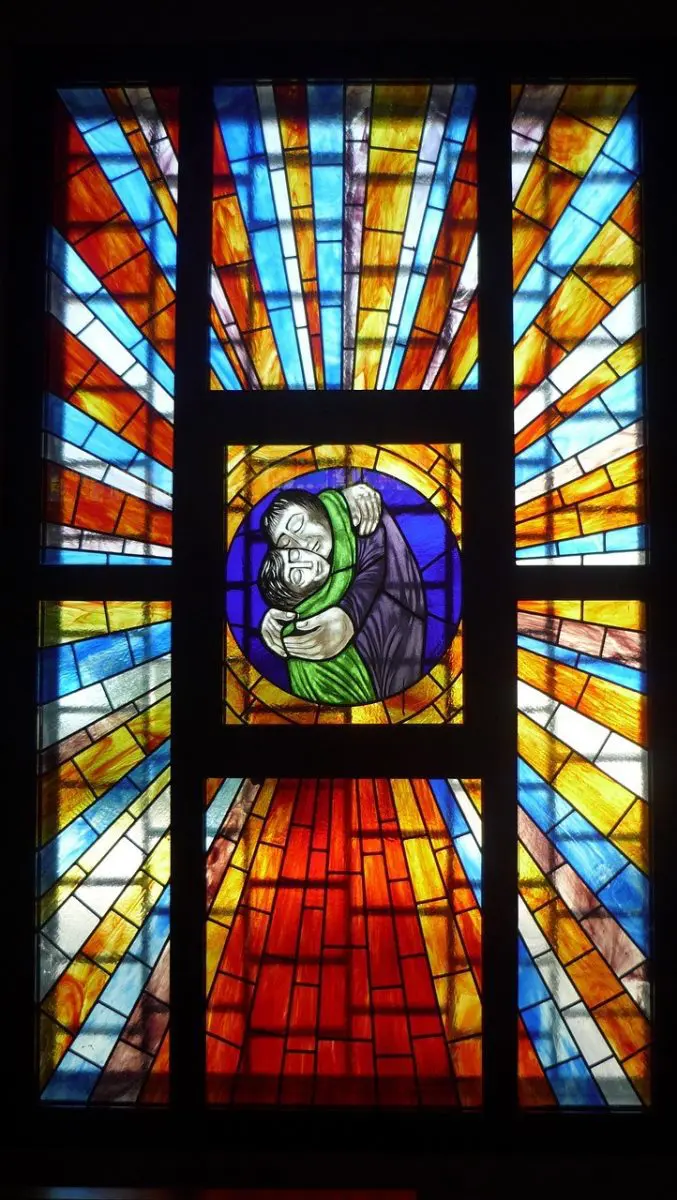What is a Disciple?
A disciple is one who follows or a student of a teacher, leaders, or philosopher. In our case we follow Jesus the greatest teacher, leader, and philosopher. As Roman Catholics we are disciples of Jesus. With that comes many invitations. Remember the calling of Simon Peter to follow Jesus (Matthew 5:1-11) ?

Peter and his clan were tired after spending the night unsuccessful at catching any fish. Jesus gives instructions, Peter and the other fishermen followed the suggestion, and they caught so many fish the nets were at the point of breaking and the boats sinking. Astonished by the miracle, Peter, John and James were in awe. Jesus said to them, “Do not be afraid; from now on you will be catching people. “ The gospel continues that Peter, John and James, left their lucrative business to become disciples!
What does that mean for us? Jesus gave an invitation to Peter, John and James. They had a choice. History tells us they chose to follow. You, also, have been chosen; you have been baptized. At baptism you were called to follow. The choice for us comes after the invitation. As the song writer Kim Walker-Smith says: “I say yes to Jesus. I say yes to your heart, your love, freedom, to your encounter.”
What is a Missionary ?

We usually think of a missionary as a person who leaves home and goes to a foreign land to bring the Good News of Christianity to those who live there. However we believe that you can be a missionary right here and right now. The term “missionary disciple” originated from the teachings of Pope Francis, particularly in his apostolic exhortation, Evangelii Gaudium (The Joy of the Gospel). A missionary disciple refers to a person who not only follows Jesus Christ but also actively participates in spreading the Gospel and sharing their faith with others. Being a missionary means a couple of things. One, we are on a mission in life. “We are born in the image and likeness of God and so we are reflections of God in the world. But then through baptism we are called to be members of the body of Christ and to carry on the work that Jesus came to do, which was to reconcile the world to our God and to reconcile us to one another.
The concept of a missionary disciple emphasizes that every Christian is called to be a witness and an active participant in the mission of the Church. It emphasizes the idea that faith is not meant to be kept private but should be shared with others, reaching out to those who have not yet encountered the teachings of Jesus Christ. You are a missionary disciple.
What is Intentionality?
Intentional means: done with a purpose, deliberate. Having a clear purpose in the thoughts and feelings that are important to you. Think about all the things you do intentionally. Perhaps you are intentional about your productivity at work, in your home, at school. Intentionality helps in prioritizing your goals, your focus, how you spend your time. Lastly, intentionality increases the value of your most important relationships, helps you experience greater gratitude, abundance and self-awareness. This week during your prayer time consider the intentionality of your relationship with God, with God’s people and with our Church. We are called to intentionality! Intentional disciples know and reflect on the many ways to enter into our church’s discipleship ministries to grow and mature. Prayer, reflection and action follow, as we begin our lifestyle as intentional disciples. This is truly good news and it is ongoing. Intentionality is a life long process that begins with the first step. Take it!

“Intentional missionary disciples” is a term often used in religious contexts, particularly within the Catholic Church, to describe individuals who actively and purposefully spread their faith and engage in evangelization efforts. Let’s break down the components of this term:
- Intentional: This refers to the conscious and deliberate nature of the disciples’ actions. They are not merely passive believers, but individuals who have made a conscious decision to actively participate in sharing their beliefs with others.
- Missionary: A missionary is someone who is sent out to propagate and promote a particular religious faith, often in areas where that faith is not yet established or is in the minority. Missionaries typically engage in activities such as preaching, teaching, community building, and social service as part of their efforts to spread their faith.
- Disciples: In religious contexts, disciples are followers or learners who adhere to the teachings of a particular faith or religious leader. In this context, “disciples” refers to individuals who are not only followers of their faith but also actively live and promote its values.
The concept of intentional missionary discipleship emphasizes a proactive approach to evangelization, where believers take on an active role in sharing their faith with others. This can involve personal interactions, community outreach, educational initiatives, and other forms of engagement that aim to spread the teachings and values of their faith.

What do Disciples do all day?
Luke, when writing the Acts of the Apostles, outlined what disciples do and how they grow. Disciples Worship; they gather on Sundays and pray every day. Disciples share community; they build relationships with others and share with them the life and community that they have found in God and their faith community. Disciples practice Spirituality; they enjoy and practice spiritual disciplines (like prayer apps, the rosary, faith sharing groups) and they begin to show others how to use spiritual disciplines to grow in faith and be drawn closer to God. Disciples are generous; they share their treasure and give beyond to others as God leads and restructures their lives and resources to join Jesus in service. Disciples imitate Christ; they partner with God to evangelize–inviting others to explore the Catholic way of life.

Missionary Discipleship
Could you be a Missionary Disciple?
As you consider the basic principles of an intentional discipleship lifestyle, make it your own. Each church, each ministry, each person has a unique context. Your experience has a way of life that works best for you. It is only by making these basic experiences your own journey to discipleship the fosters growth.
The aim is not that you adopt this one path, but that you become intentional about your way of life. Indeed, there is no cookie-cutter approach to making disciples, and each disciple’s journey and each church’s process is unique. And yet we, as disciples of Jesus, have a role to play in our own growth as individual disciples, in our accountability to and with other disciples, and in the formation of an intentional discipleship ministries for our church. We must take our part in the discipleship process seriously as it has been entrusted to us by Jesus. At the beginning of this post, we asked, Could you be a Missionary Disciple, and the answer is: YES, I already am one!
By virtue of baptism, all the members of the People of God have become missionary disciples (Mt 28:19). All the baptized, whatever their position in the Church or their level of instruction in the faith, are agents of evangelization, and it would be insufficient to envisage a plan of evangelization to be carried out by professionals while the rest of the faithful would simply be passive recipients. The new evangelization calls for personal involvement on the part of each of the baptized.
Every Christian is challenged, here and now, to be actively engaged in evangelization; indeed, anyone who has truly experienced God’s saving love does not need much time or lengthy training to go out and proclaim that love.
Every Christian is a missionary to the extent that he or she has encountered the love of God in Christ Jesus: we no longer say that we are “disciples” and “missionaries,” but rather that we are always “missionary disciples.”
How does God equip me to be a Missionary Disciple?
The Holy Spirit, who bestows every gift and stands as the central force driving the Church’s vitality, operates not only through the sacraments. In accordance with the teachings of St. Paul, the one who imparts gifts as He desires (1 Corinthians 12:11), pours a vast abundance of graces upon the People of God.
The Second Vatican Council echoed this concept in connection with St. Paul’s writings, stating that the Holy Spirit bestows unique graces upon all believers. Through these gifts, individuals are equipped and prepared to undertake various roles and responsibilities, contributing to the Church’s renewal and growth. This aligns with St. Paul’s words: “The manifestation of the Spirit is given to everyone for profit.” (1 Corinthians 12:7)
It is crucial to recognize that many charisms primarily seek not the personal sanctification of the recipients, but rather, the service of others and the well-being of the Church. These charisms are instrumental in nurturing the development of Christ’s Mystical Body.
As both St. Paul and the Council emphasized, these charisms originate from the Holy Spirit’s free and voluntary choice. In our present age, we cannot help but admire the extensive array of gifts that the Holy Spirit confers upon laity as integral members of the Church. Each individual possesses the requisite capabilities to fulfill their designated roles for the betterment of the Christian community and the salvation of their endeavors. This potential is realized when one remains open, receptive, and loyal to the Holy Spirit’s influence.
Based on the words of Pope Francis on the gifts of the Spirit.
What’s a “None”?
We represent a missionary Church, rooted in the teachings of Jesus who unequivocally defined the Church’s mission through His Great Commission: “Go, therefore, and make disciples of all nations…” (Matthew 28:19). This profound mandate defines our very essence. In the words of Pope Francis, it becomes clear: “What if we were to truly embrace these words? We would come to understand that missionary outreach serves as the model for all of the Church’s endeavors” (Evangelii Gaudium, 15). Furthermore, he succinctly proclaims, “The Church is, in its essence, a community of missionary disciples” (Evangelii Gaudium, 40).
While the mission field is vast and all-encompassing, one specific group warrants our immediate attention—the “Nones,” a swiftly expanding demographic of individuals who opt not to associate with formal religious institutions. Recent studies have identified them as the fastest-growing religious category in America.
Pope Francis passionately urges us “to venture beyond our comfort zones and illuminate all the ‘peripheries’ yearning for the Gospel’s light” (Evangelii Gaudium, 20). What’s even more pressing is that this group is proliferating most rapidly among the youth. Pope Francis echoes the call to “step out of our comfort zones to reach all the ‘peripheries’ thirsting for the Gospel’s illumination” (Evangelii Gaudium, 20). Perhaps you know or live with someone who might like to know about the church and be willing to give the church a second look. Please invite them to join you at this wonderful church as we gather to share the good news of Jesus Christ.
Disaffiliation
Over the past three decades, there has been a noticeable increase in the number of young people who no longer identify with any particular religious group. This trend of religious unaffiliation reflects a broader societal shift where individuals across all age groups express decreased confidence in various institutions. Gallup polls, spanning back to the 1970s, have consistently shown a significant decline in Americans’ trust in a wide range of institutions, including big businesses, the healthcare system, the presidency, television news, the U.S. Congress, public schools, newspapers, and banks. In a similar vein, trust in religious institutions has also waned, indicating that young people harbor a general sense of skepticism toward religious leaders and, by extension, religious communities in general.
Even more concerning is the phenomenon of disaffiliation, which involves individuals actively choosing to sever their ties with a religious community. While many young people who identify as unaffiliated may simply lack a connection to any religious tradition, those who disaffiliate are former members of congregations, schools, or other religious organizations who have opted to depart for a variety of reasons.
These trends in unaffiliation and disaffiliation should prompt Catholic parents and religious educators to engage in thoughtful reflection on the factors that contribute to positive religious formation. These developments raise challenging questions: How can we effectively evangelize? Who are we failing to engage with? What actions might our community be taking that drive young people away? What kind of invitation are we extending to young people? How might a mature Catholic faith contribute to the flourishing of a young individual?
